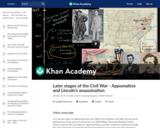
The end of the Civil War, including Lee's surrender at Appomattox and the assassination of Abraham Lincoln.
- Subject:
- History
- U.S. History
- Material Type:
- Lesson
- Provider:
- Khan Academy
- Provider Set:
- Khan Academy
- Author:
- Kim Kutz
- Date Added:
- 08/10/2021

The end of the Civil War, including Lee's surrender at Appomattox and the assassination of Abraham Lincoln.
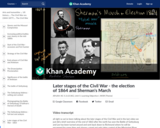
KA's historian Kim discusses the year 1864 of the Civil War, including Sherman's March to the Sea and the election of 1864.
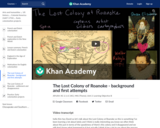
Kim and David discuss the mystery of the "Lost Colony" on Roanoke Island, the English settlement in North America that vanished in the late 1500s. In this video, they set the stage for the colonial venture and discuss the first two missions to Roanoke Island.

Kim and David continue discussing the Lost Colony of Roanoke. What happened when the English colonists finally settled on the coast of North Carolina? What are the prevailing theories about what happened to the colonists?

What were the causes and effects of westward expansion between 1844 and 1877? Kim discusses how economic opportunities, government support, and the idea of 'manifest destiny' brought migrants to the western United States.
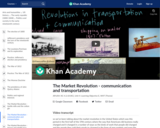
Canals, railroads, steamboats, telegraphs! Kim talks about the transportation and communication revolutions of the early 19th century and how they changed American business.

So what's the big deal about the Market Revolution, anyway? Kim describes how it changed the nature of American labor, markets, and culture.

The Market Revolution of the early nineteenth century changed the way Americans worked and did business. In this video, Kim discusses the inventions that brought new productivity and forms of work to American business - the Industrial Revolution.
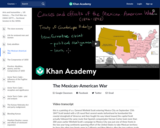
What were the causes and effects of the Mexican-American War? In this video, Kim discusses how Manifest Destiny and the annexation of Texas brought on the war, as well as how the war affected US politics and the existing residents of the Mexican Cession.
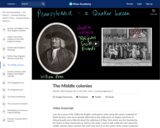
The Middle colonies consisted of Pennsylvania, New Jersey, New York, and Delaware. Located in the middle of the Atlantic seaboard, their economies combined the industry of the North with the agriculture of the South. They were unusual, however, for their degree of religious toleration and their wide range of ethnic diversity.

In the late nineteenth century, sociologists misused Darwin's theory of evolution to justify racism. KA's historian Kim and biologist Emily discuss how evolution really works and how sociologists in the Gilded Age misunderstood its application to human society.

Does "survival of the fittest" apply to human culture? Kim and Emily continue their discussion of the theory of evolution and how Gilded Age sociologists mistakenly applied it to race and class.
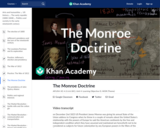
In 1820, James Monroe articulated the US foreign policy goal of ending European colonization in the Americas.

In the late 1500s and early 1600s, the United Kingdom cast its gaze westward and joined the quest for American colonies. In this video, Kim discusses the motivations for English colonization, including competition with Catholic nations for riches and souls, and the development of 'joint-stock' companies.

What was life like in North America before Europeans arrived? In this video, Kim explores how different environmental factors in North America shaped a variety of Native American societies.

In the late 1400s, several developments in Europe paved the way for European exploration in the Americas. In this video, Kim discusses how Portugal led the charge with new navigation technology, and how the unification of Spain set the stage for Columbus's voyage in 1492.
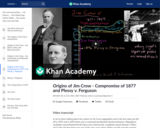
Federal troops left the South after the Compromise of 1877, ending Reconstruction. The Supreme Court ruled that segregation did not violate the Fourteenth Amendment in the Plessy v. Ferguson decision of 1896.

In the period after the Civil War in the American South, when Southern society reorganized to account for the end of slavery. In this video, Kim discusses how many Southern governments passed laws preventing African Americans from voting, among other things, which prompted Congress to pass the Fourteenth Amendment.
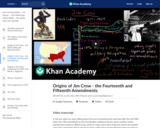
During Reconstruction, federal troops attempted to enforce the Fourteenth and Fifteenth Amendments in the South.
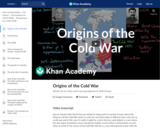
The Cold War was a period of increased tensions and competition for global influence between the United States that lasted from approximately 1945 until 1991. Tensions increased in the aftermath of World War II when the United States dropped the atom bomb and Russian forces took over Eastern Europe. During the Cold War, the United States and the Soviet Union never directly attacked one another, but instead fought proxy wars in order to repel or spread communism, respectively.